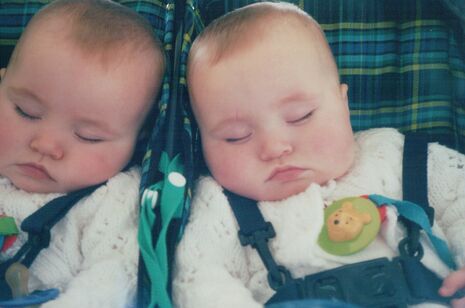The perks & perils of twin rivalry
Jess Molyneux draws parallels between academic rivalry at Cambridge and lifelong competition with her identical twin

Cover your ears, Blues: for me, competition isn’t all about sport. If you’d ever been a spectator at my secondary school rounders matches, you wouldn’t think I was the competitive type. Instead of squealing in frustration at fellow team mates, I was pretty much a spectator myself. In my case, that pushy spirit which team games seem to bring out in some people was channelled elsewhere.
There’s a fine line between sharing spaces and battling for territory, and being a twin really tunes you in to the delicacy of that border. Competition isn’t something fired up by a league table or tournament, it isn’t inspired by team pride or a one-off chance to be the best - it’s a way of life. Home isn’t a battlefield, nor every school day a 100m sprint, but it’s difficult to get across just how intensely competition, weighted comparison, mutual spurring, shapes the way you think as a twin, how pervasively it seeps into everyday life.
To a large extent, when you know no different, it barely poses a problem, and, at least for me and my sister, it becomes a positive force: competition got us both to where we are now. When the only method within your control to make sure you’re the ‘better twin’ (because, trust me, people ask for that ranking surprisingly and unoriginally often) is to try as hard as you can, you’re always going to do your best. And just to chill out what sounds like a pretty intense picture of twin life, the coolest thing about competition with my twin is its paradoxical support in practice. Who better to be sprint-finishing with than the best friend who you trained alongside, who gets and mirrors your pace and your rhythm, who wants to finish joint first with you?
“I’m not sure exactly at what point last term it fully sank in that life in Cambridge doesn’t have to be a competition”
Things get a little more complicated between Oxford and Cambridge. Not only is competition compounded by a healthy bit of institutional rivalry, but you’re now playing in different leagues. That analogy breaks down pretty quickly, because they run parallel (although if I had to force it, Cambridge is obviously the Premier League to Oxford’s EFL Championship). Let’s say we’re playing different sports: different universities, different courses, different cities, different career paths. Either way, comparison, and so competition, is pretty much off the table.
Liberating? Not quite. Unfortunately, the natural response to such a disorientation, being forced to recalibrate and modify my habits in reaction to losing something so foundational to my way of thinking, working, and evaluating myself, is a degree above bewilderment and a degree below paranoia. Instead of taking a step back and developing new methods for target-setting and mindsets for work, exercise, extra-curriculars, panic sets in and the search for a new opponent kicks off. This is quite a strenuous task to add to all the other actual necessities of Michaelmas term, since it involved seeking, finding, and destroying a single comparable soul. It means sussing people, comparing their habits and achievements to yours, instinctively, to a less than healthy extent. It means getting stressed when from the multitude of options on the reading list, or stalls at the freshers’ fair, someone picks or does better or more or just different, and you have to square that with, weigh it against, your own achievements, because that’s just how your brain has been wired for nineteen years. It means, in short, trying to find your twin in Cambridge.
All of us, anyone who had that one person in sixth form who was always ‘the one to beat’, will feel that pressure of comparison and evaluation in relation to someone who represents the pinnacle of achievement. Comparison culture is certainly not exclusive to twins. But that figure is, of course, necessarily a phantom. Not only is it impossible to find someone who is directly comparable, who is always aiming for the same goals as you without fluctuation, there just isn’t a metric of comparison which you can use. Do you ‘win’ if you finish the text first and hand in the essay impressively early, or is it ‘better’ to have been reading right up to the deadline? Have you done the ‘best thing’ if you went to the lecture, or to the careers workshop? Or, even, if you took the afternoon off and gave yourself some well-deserved and well-needed rest?
For everyone, a bit of healthy competition is what got us here – most of us couldn’t help but be aware of application statistics pitching us against our peers. But it shouldn’t be, and it can’t be, what sustains us while we’re here. I’m not sure exactly at what point last term it fully sank in that life in Cambridge doesn’t have to be a competition, or at least that there doesn’t have to be just one winner. Maybe I had been missing my sister more than I realised, and seeking competition was a weird, go-to way of emulating our relationship. But as soon as I realised that there are a number of ways of finding a surrogate twin here in Cambridge, course friends you can have excited chatter with, college spouses you can confide in, chill with, cry to, it didn’t seem as much like a tournament or a race or a league table. We might not be at that sprint-finish yet, but we’re all in it together.
 News / Christ’s announces toned-down ‘soirée’ in place of May Ball3 February 2026
News / Christ’s announces toned-down ‘soirée’ in place of May Ball3 February 2026 News / Deborah Prentice overtaken as highest-paid Russell Group VC2 February 2026
News / Deborah Prentice overtaken as highest-paid Russell Group VC2 February 2026 News / Right-wing billionaire Peter Thiel gives ‘antichrist’ lecture in Cambridge6 February 2026
News / Right-wing billionaire Peter Thiel gives ‘antichrist’ lecture in Cambridge6 February 2026 Fashion / A guide to Cambridge’s second-hand scene2 February 2026
Fashion / A guide to Cambridge’s second-hand scene2 February 2026 News / SU votes unanimously to support community kitchen4 February 2026
News / SU votes unanimously to support community kitchen4 February 2026










